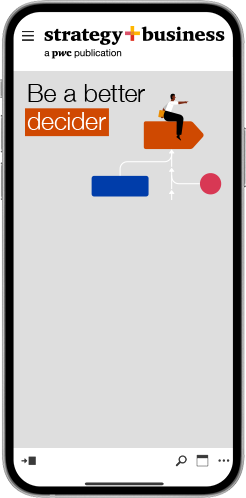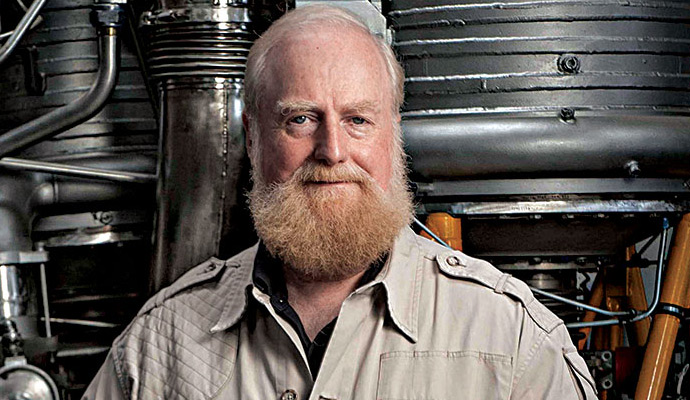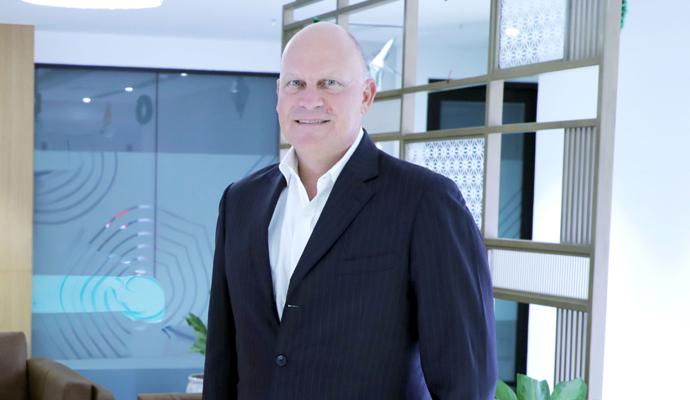How Richard Branson Works Magic
Though more known for his legendary publicity stunts, Richard Branson has led Virgin Group to success with a singular, flamboyant style. Learn the secret of how he tackles the big bad wolves of many industries.
Richard Branson, the 48-year- old chairman of the London-based Virgin Group, has parlayed a lifelong disdain for conventional business wisdom into a $3.5 billion international conglomerate and one of the world's most powerful and recognizable brands. Under the ubiquitous Virgin banner, Mr. Branson has ventured into a panoply of businesses - from condoms to wedding gowns, from airlines to financial services - and in the process has taken on entrenched giants and wrested market share from them.
All the while, the flamboyant and irreverent Mr. Branson has tweaked the business establishment, particularly in Britain, and displayed a P.T. Barnum-like command of publicity and showmanship to gain priceless cachet for the Virgin brand. He has been, for much of the past 30 years, one of the most admired Britons, and his fame has spread in recent years around the globe as Virgin has expanded its reach and its luster.
Mr. Branson loves nothing more than a daunting challenge; he views the impossible as just another business opportunity. Who else but Mr. Branson would put the vibrant Virgin label on the decaying British Rail with hopes of turning the dilapidated railroad into a sleek, profitable business? And throughout his career, he has cleverly embraced the David role, taking on Goliaths like British Airways, EMI Music and Coca-Cola, with the intent of becoming the best rather than the biggest and working under the assumption that there are significant profits to be made in small pieces of big markets.
His trademark is outlandish publicity stunts. He will do almost anything to promote the Virgin brand: driving a tank down Fifth Avenue in New York to introduce Virgin Cola to the United States, risking his life in high-profile hot-air balloon adventures or portraying a drowning victim on television's "Baywatch."
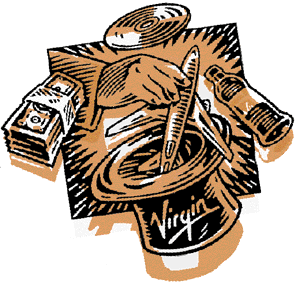 Indeed, so crucial is the continued high profile of Virgin that Mr. Branson says his highest paid and most important employee is Will Whitehorn, his public relations and communications director. "I suspect in most companies, the public relations person is down at No. 20 in the pecking order," Mr. Branson says. "But, here, he is fighting incredibly important battles. If a negative story starts running away with itself in the press and is not dealt with fast, it can badly damage the brand. And so we put enormous weight on our public relations people."
Indeed, so crucial is the continued high profile of Virgin that Mr. Branson says his highest paid and most important employee is Will Whitehorn, his public relations and communications director. "I suspect in most companies, the public relations person is down at No. 20 in the pecking order," Mr. Branson says. "But, here, he is fighting incredibly important battles. If a negative story starts running away with itself in the press and is not dealt with fast, it can badly damage the brand. And so we put enormous weight on our public relations people."
Mr. Branson reportedly sets aside at least 25 percent of his time for public relations activities, and Mr. Whitehorn has a staff member whose sole responsibility is devising the headline-catching publicity stunts for which Mr. Branson has become known. "If your staff works enormously hard to create something they are proud of, it's foolish if you don't let the world know about it," Mr. Branson states. "Using yourself to get out and talk about it is a lot cheaper and more effective than a lot of advertising. In fact, if you do it correctly, it can beat advertising hands down and save tens of millions of dollars."
But Mr. Branson stands for more than balloon trips and powerboat races across the Atlantic. Behind the brash and insouciant huckster, there lies a sharp business visionary who has created a formula for success that is rife with lessons for chief executives in any country and any business. The Branson magic is not about smoke and mirrors, but rather is a kind of chicken soup for the moribund, tradition-bound corporate soul. Mr. Branson's success reflects an uncanny ability to take the consumer's point of view as his own and Þnd ways to embrace that view for profit.
Despite his personal riches, Mr. Branson has retained an "everyman" persona marked by his casual dress, affable and modest manner, and devilish disrespect for convention. He understands viscerally the concerns and needs of his customers and his employees and acts as a conduit for fulfilling those needs. He has built the Virgin brand in his own image, and the result is an extremely positive emotional bond between consumers and companies that bear the Virgin label. It is brand-builder's nirvana, made all the more impressive because the brand is all that ties together more than a hundred disparate Virgin businesses. There is little synergy or shared resources among the Virgin companies; Virgin, in fact, resembles the classic Japanese keiretsu such as a Yamaha or Mitsubishi.
Branding An Ethos
With Virgin, Mr. Branson has displayed remarkable staying power that is made possible only by adhering to his own carefully honed set of business values. From the winter of 1969, when as a 19-year-old wunderkind he founded his first venture - a mail- order record business, which evolved into a recording studio dubbed Virgin Records - Mr. Branson established a clear business ethos that had its genesis in the anti-establishment counterculture of the 1960's and remained steadfast even as the company grew and Mr. Branson himself evolved from the "hippie capitalist" into a widely admired billionaire.
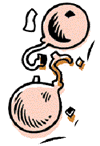 Writing in a British management journal, Alan Mitchell noted that Mr. Branson found his winning formula in the clashing values of the 60's: profit versus people; money versus morality; the corporation versus the consumer; big (business) versus small (human); formal versus informal; planning versus spontaneity; conventionality versus novelty; hierarchy versus egalitarianism; secrecy versus openness. Mr. Branson always chose the humanistic path, and "yet uniquely, he's turned these values back on business itself, forging an unexpectedly vibrant synthesis," Mr. Mitchell wrote.
Writing in a British management journal, Alan Mitchell noted that Mr. Branson found his winning formula in the clashing values of the 60's: profit versus people; money versus morality; the corporation versus the consumer; big (business) versus small (human); formal versus informal; planning versus spontaneity; conventionality versus novelty; hierarchy versus egalitarianism; secrecy versus openness. Mr. Branson always chose the humanistic path, and "yet uniquely, he's turned these values back on business itself, forging an unexpectedly vibrant synthesis," Mr. Mitchell wrote.
The vibrant synthesis is based on a set of five criteria that Mr. Branson has incorporated into every business he has started and every joint venture he has entered. A product or service cannot hope to bear the Virgin label unless it meets these conditions:
- It must have high quality.
- It must be innovative.
- It must provide good value for the money.
- It must be challenging to existing alternatives.
- It must have a sense of fun.
With these core values as the common thread, Mr. Branson has entered one business after another in which he perceived a customer set that was being underserved by a fat and complacent dominant player. Whereas most would avoid such elephantine competition as British Airways or Britain's entire financial services industry, Mr. Branson sees a "bigger, softer underbelly" that is vulnerable to attack. He calls it the "Big Bad Wolf" theory. "We look for the big bad wolves who are dramatically overcharging and underdelivering," he explains.
When he was approached in the early 1980's with the idea of starting an airline, for example, Mr. Branson was intrigued. He had long been frustrated by the poor service and inattention to customer needs of monopolistic airlines like British Airways. Though he had become a millionaire in the music industry with Virgin Records and though his business partners were aghast at the idea that he would risk the profitable company on a business he knew nothing about, Mr. Branson saw opportunity. "Tell Richard that something is impossible and watch his eyes light up," says David Tait, head of Virgin Atlantic's North American operations.
In Virgin Atlantic, Mr. Branson designed an airline to please himself, figuring he embodied the typical air traveler. Starting with a single 747-200 in 1984, Virgin Atlantic began flying the popular London-to-New York route with two things in mind: lower prices and better service. While a passenger is stuck in a metal tube for seven hours, why not serve better meals; offer more entertainment; have smiling, enthusiastic flight crews, and create fun? Eschewing first class, Virgin Atlantic would offer a first-class experience at business-class prices.
In the past 14 years, the airline has shaken up the industry with innovative ground and on-board service and entertainment. Virgin Atlantic offers spa-like lounges in its hub airports replete with showers, putting greens, haircuts, massages and manicures. In the air, more massages, manicures and full sleeping outfits are available for its business-class passengers. It was the first airline to offer more than two choices of meals, even in economy, and it was also the first to put seat-back videos in every seat on every plane.
 Mr. Branson, who favors the airline perhaps more than any other part of his empire, flies frequently and usually spends the entire flight chatting with passengers, serving drinks, leading games over the public address system and helping the flight crew with even the most menial tasks. In the early days, when there were far fewer than the current 22 aircraft in Virgin's fleet, Mr. Branson regularly appeared at Heathrow Airport to apologize personally to disembarking passengers if a flight was late. Though he cannot physically be on every flight, Mr. Branson's presence is felt through the enthusiasm evident in his employees, most of whom seem to be simply having a better time at their jobs than their counterparts on other airlines.
Mr. Branson, who favors the airline perhaps more than any other part of his empire, flies frequently and usually spends the entire flight chatting with passengers, serving drinks, leading games over the public address system and helping the flight crew with even the most menial tasks. In the early days, when there were far fewer than the current 22 aircraft in Virgin's fleet, Mr. Branson regularly appeared at Heathrow Airport to apologize personally to disembarking passengers if a flight was late. Though he cannot physically be on every flight, Mr. Branson's presence is felt through the enthusiasm evident in his employees, most of whom seem to be simply having a better time at their jobs than their counterparts on other airlines.
And all Mr. Branson has done is insist on treating his customers as he himself wished to be treated. This was nothing short of revolutionary in the airline industry. In short order, Virgin Atlantic has become an industry favorite, winning countless travel awards and becoming the second largest long-haul carrier on the London-to-New York route. Growth has been measured, steady and slow as Virgin Atlantic has expanded into eight United States cities as well as Asia and South Africa. Mr. Branson now has his sights set on building a domestic United States carrier if he can tear down the barriers blocking foreign-owned airlines from offering routes within the United States.
THE MEASURE OF SUCCESS
Like other great entrepreneurs, Mr. Branson is unafraid of failure. But unlike many other successful business leaders, he refuses to stay within the confines of a single core business. Rather than "sticking with what you know," Mr. Branson's credo is "if you know one business, you know any business." He adds: "If you can run a record company, you can run an airline. If you can run an airline, you can run a bank. If you can run a bank, you can run a soft drink company." And on and on.
He acknowledges that his philosophy is centered on finding the best people to run these businesses, but he insists that he is not so much concerned about industry-specific expertise as strong people skills that mesh with the Virgin culture. "What makes somebody good is how good they are at dealing with people," Mr. Branson states. "If you can find people who are good at motivating others and getting the best out of people, they are the ones you want. There are plenty of so-called experts, but not as many great motivators of people."
Virgin tends to promote from within, and the winning profile, not surprisingly, is Branson-like: someone who gets charged up when told that something cannot be done; someone who is undaunted by industry barriers and will not take no for an answer.
And Mr. Branson tends to focus far less on profits and far more on industry impact. Because Virgin is privately held, Mr. Branson declines to talk about specific numbers. He says, "It's important to pay the bills." But once Virgin reached solid financial ground in the early 1990's -- mainly from the $1 billion sale of the Virgin Records label to Thorn-EMI -- and survival was no longer an issue, Mr. Branson's attentions were focused on higher ground.
He says his measure of success is creating a business whose practices are completely different from the way others do things, whose staff can be proud and whose product or service makes a positive impact on consumers. "There's no point in going into a business unless you shake up the whole industry," Mr. Branson says. "Then, you are not just making a difference for yourself. You find the whole industry has to react to your being there and change the way it does business."
Tired of giving 5 percent of his money on the day he signed up with a financial services company, for example, Mr. Branson started Virgin Direct, which eliminated the fine print and the hidden fees and quickly started winning customers from competitors. In just two years, Virgin Direct, a firm somewhat like Fidelity or Vanguard in the United States, has brought in more than 400,000 customers and has $3.5 billion under management. Every other financial services company in Britain has had to reduce its rates to compete, which is just the kind of reaction Mr. Branson relishes. He says he has his sights set next on the British telecommunications industry.
A STAR IS BORN
Ever the radical, Mr. Branson says his only business role model was a person who had failed. Fellow iconoclast and entrepreneur Freddie Laker had attempted to take on British Airways with a low-cost trans-Atlantic airline a few years earlier and had been driven out of business by the competition. Nevertheless, Mr. Branson, sensing a kindred spirit, sought Mr. Laker's counsel in the early 80's. The airline, Mr. Laker advised him, had to concentrate not just on low cost but also on offering quality and value for the money. It had to be innovative and, most of all, fun. The airline's employees, therefore, were the real asset, not the planes.
And it was Mr. Laker who brought out the Barnum in Mr. Branson. "Freddie Laker sat me down and said, 'If you are going to take on Pan Am, T.W.A. and British Airways, you've got to use yourself and get out there and realize that if you dress up in a captain's outfit when you launch the airline, you'll get on the front page. If you turn up in ordinary business clothes, you'll be lucky to get a mention. Remember, the photographers have a job to do; they'll turn up to one of your events and give you one chance. If you don't give them a photograph that will get them on the front page, they won't turn up to your next event.'"
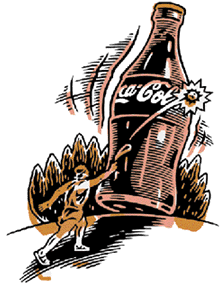 Despite his public persona, Mr. Branson claims to be shy and introverted. He says he had to force himself to make speeches, embrace the photo opportunities and take part in the public relations soirees. But, he tells other chief executives, it can be done. "Before we launched the airline, I was a shy and retiring individual who couldn't make speeches and get out there," he says. "I had to train myself into becoming more of an extrovert."
Despite his public persona, Mr. Branson claims to be shy and introverted. He says he had to force himself to make speeches, embrace the photo opportunities and take part in the public relations soirees. But, he tells other chief executives, it can be done. "Before we launched the airline, I was a shy and retiring individual who couldn't make speeches and get out there," he says. "I had to train myself into becoming more of an extrovert."
And the metamorphosis has paid off. His outrageous stunts and accessibility to the media have provided huge competitive advantage in the brand wars. For example, his media stunts in introducing Virgin Atlantic's new "drive-through" airport check-in, and later Virgin Cola, spawned widespread newspaper coverage and led to five-minute segments on NBC's "Today" show and a national audience of millions of Americans -- at no cost to Virgin. He won a highly publicized libel settlement of nearly $1 million from British Airways in the early 1990's and milked the David-slaying-Goliath angle for all it was worth.
Mr. Branson is quite pleased that most business leaders remain below the parapets. "From a competitive point of view, the longer they continue to think that way, the better for us," he states. He relates a conversation with a BBC producer who told him that 99 out of 100 invitations to British chief executives to appear on television are refused. Conversely, Virgin is always available for air time. "With a television spot, you are reaching 10 million people," Mr. Branson says. "It would be bloody stupid to say no."
EMPLOYEES FIRST
A genius for publicity, however, is only one facet of Mr. Branson's business talent. Perhaps more crucial to his success is his order of priorities. While most chief executives focus on creating shareholder value and devote their attention primarily to customers, Mr. Branson believes that the correct pecking order is employees first, customers next and then shareholders. His logic is simple and sound: If your employees are happy, they will do a better job. If they do a better job, the customers will be happy, and thus business will be good and the shareholders will be rewarded.
To this end, Mr. Branson goes to unusual lengths. He regularly takes out entire flight crews for dinner and parties when he arrives on a Virgin Atlantic flight. He even stays at the crew's hotel rather than in expensive digs downtown. He gives every Virgin employee a Virgin card, which provides big discounts on the airline as well as at Virgin Megastores and other Virgin businesses.
Because of Virgin's many disparate businesses, Mr. Branson likens his role to that of a commander of many armies fighting battles around the world. "In a sense, you are ultimately directing the war, and the critical thing is constantly being in touch and motivating your troops and helping people if they've got a problem," he says.
So he is continually on the road, visiting Virgin businesses, talking with employees and customers. Mr. Branson is known for his ever-present notebook and pen, which he pulls out whenever he chats with employees or customers. He insists that this is a crucial element in his role as chairman and that by writing things down, he creates a regular list of items for immediate action. Most chief executives, he notes, will chat with employees in the course of their travels but by the next day will remember little of what they were told.
Mr. Branson reads mail from employees every morning before he does anything else. This habit, which he started in Virgin's early days, changes the company-employee dynamics dramatically. Employees do not hesitate to air their grievances directly to Mr. Branson, and he has proved with his actions that he not only listens but also responds. He says that although Virgin has 20,000 employees around the world today, he gets only 25 to 30 letters each morning. "It's not as many as you think because they know they can do it," he explains.
The letters run the gamut, from small ideas to frustrations with middle management. Mr. Branson addresses every one either by answering personally or by initiating some action. "Instead of needing a union when they have a problem, they come to me," he says. "I will give the employee the benefit of the doubt on most occasions." His loyalty to the rank-and-file employees is returned in kind. Working for Virgin, especially in Britain, is nothing short of a badge of honor.
While being interviewed for this article, for example, Mr. Branson was vacationing on his private Caribbean island, called Necker. Along with him for his sojourn, he had brought 20 employees from various Virgin companies. And these were not senior executives, but the rank and file -- a housekeeper from Johannesburg, a switchboard operator, a reservations clerk, a pilot -- who were invited because of excellent performance. This is a regular perk for Virgin employees, and Mr. Branson, rather than feeling intruded upon, delights in the company.
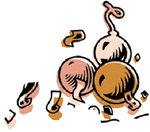 "The idea is to have fun, but by talking to employees, you learn a lot as well," he says. Reminded that it is the rare chief executive who takes employees along on vacation, Mr. Branson laughs and says, "I can assure you, it's no sacrifice." But it sends a powerful message and creates enviable loyalty in his growing work force. In fact, Virgin employees are as likely to say they "work for Richard" as for Virgin.
"The idea is to have fun, but by talking to employees, you learn a lot as well," he says. Reminded that it is the rare chief executive who takes employees along on vacation, Mr. Branson laughs and says, "I can assure you, it's no sacrifice." But it sends a powerful message and creates enviable loyalty in his growing work force. In fact, Virgin employees are as likely to say they "work for Richard" as for Virgin.
Mr. Branson also hosts an annual summer party for all Virgin employees at his country home outside London. This year the party lasted seven days, and more than 25,000 employees and family members attended. Nearly all were greeted at the door by Mr. Branson, who is likely to be the first in the swimming pool. He also attends as many orientations for new staff as possible in order to set the tone and send the message. "I say: 'Get out there and have a good time. Really enjoy yourself, because most of your life is spent working, and you ought to have a great time doing it.' It's much nicer paying the bills when everybody is having a good time."
And all the while, Mr. Branson is Virgin's most enthusiastic cheerleader, offering constant praise to employees for their efforts. He recalls how his mother and father always looked for the best in their children, and he does that now with his own son and daughter. "I will praise, praise, praise," he says, "and only criticize if they are going to kill themselves crossing the road. People know when they've done things wrong; they don't need to be told. When I write my letters to employees, you'll never see a line of criticism."
STAYING THE COURSE
But if Mr. Branson is part father figure, part psychologist and part camp counselor, he is also an astute and demanding businessman. He can be ruthless, manipulative and controlling, according to various press reports about him. He insists, for example, that Virgin have no less than 50 percent stake in any company bearing the Virgin label and that his managers retain control of the operations.
He has also orchestrated shrewd business deals that helped finance Virgin's growth without using the company's money. Mr. Branson says such deals are possible only because of the strength of the Virgin brand. For example, the recent creation in Britain of the Virgin bank, which is an operation separate from Virgin Direct, was financed to the tune of $500 million by other investors, and Virgin retained a 50 percent stake without coughing up a penny. "We're launching new companies that are 100 percent funded by external investors based on the power of the brand," he says.
It would seem that the very power of the brand would be kept under tight control, lest it become diluted. Yet, being an inveterate risk taker and thrill seeker, Mr. Branson needs big challenges to keep him interested. Taking on Coke and Pepsi was one way to do that.
Virgin Cola, according to Mr. Branson, is ready to overtake Pepsi in Britain, and he insists the soft drink will outsell Pepsi outside North America in his lifetime. About Coca-Cola, he is more restrained. He does not expect to topple Coca-Cola, arguably the world's best brand, anytime soon. But this does not bother Mr. Branson in the least. He says that Virgin Cola will grab a market share of 1 percent or 2 percent in the United States and that this will be "enough to pay the bills and get a base to start building on." The real challenge, he adds, "is taking on the biggest brand in the world and seeing what we can do with it."
Acknowledging the gamble on cola, Mr. Branson suggests that he is taking an even bigger risk in putting the Virgin name on the British Rail, Britain's most run-down and neglected network. With no money invested in its infrastructure in the past 30 years, the public train system was simply grinding to a halt when Virgin decided to run it privately. The company is investing $2 billion on new high-speed trains and a renovation of all the tracks. But it will be four years before the restoration is complete, and so the Virgin label must endure being associated with an inferior product for a long stretch.
The company, Mr. Branson says, could not pretend that Virgin had not taken over ownership. Efforts to improve existing conditions have already paid dividends in the first 12 months, with on-time performance improving from 78 percent to 90 percent and 16 percent more people using the trains, resulting in a £25 million profit, compared with a loss of £20 million the year before.
Nevertheless, Mr. Branson admits that "this is the biggest risk we've taken with the brand in Britain." Disgruntled passengers who never bothered to complain when the British Rail name was on the trains feel justified in airing their frustrations now that Virgin graces the engines. Though Virgin has failed at other business investments and escaped with its reputation intact, sustained problems with the railroad could tarnish the brand.
But Mr. Branson, ever the optimist, foresees a positive outcome. "You can't be afraid to take risks," he says. "I believe that if my balloon goes down in 10 years' time, the success we've made with Virgin trains will be a greater part of my legacy than Virgin Atlantic. There may be short-term damage, but in the long run, it was the right thing to do."
Though the Virgin brand is so inextricably tied to his name, Mr. Branson insists that the brand will live on even if one of his risky adventures does him in prematurely. "It will be a different kind of brand, probably more mature than it's been before and slightly less risque," he says. "But there is no reason commercially that it shouldn't go on in strength."
The more crucial lesson, he says, is retaining the values he has instilled even as the company grows larger and larger. "You've got to treat people as human beings -- even more so as the company gets bigger," Mr. Branson says. "The moment I start to think 'I've made lots of money, I'm comfortable, I don't need to bother with these things anymore,' that's when Virgin will be at real risk."
BRANSONISMS
Richard Branson did not become a favorite of the business media solely on the basis of his publicity stunts; he is also eminently quotable in sound bites. Here are some gems from our interview with him:
"Obviously, the David image has done Virgin no harm. And if we ever became a Goliath, I think another David would set up and take us on."
"You never enter a new business unless it will enhance the brand."
"You fail if you don't try. If you try and you fail, yes, you'll have a few articles saying you've failed at something. But if you look at the history of American entrepreneurs, one thing I do know about them: An awful lot of them have tried things and failed in the past and gone on to great things."
"We look for the big bad wolves who are dramatically overcharging and underdelivering."
"There are quite a few things I've done that even I thought might have been one step too far. But if you are willing to make a fool of yourself and make people smile -- as long as you do it with a sense of fun -- you can get away with it.""We look for the big bad wolves who are dramatically overcharging and underdelivering."
"We're launching new companies, 100 percent funded by external investors, based on the power of the brand."
"I'm absolutely certain that in my lifetime we will overtake Pepsi in the world outside America."
"If something happens to me, bizarrely, it might be the best thing that happens to the brand in that when a rock star gets killed, the sales of his albums triple. As long as I go quick, with my reputation still intact, then I think the brand can go on living well indefinitely."
"If you grow a company from scratch, you can get the right people from day one; you can get the products right from day one, get the pricing right. It's much easier."
"In a sense, you are ultimately directing the war and the critical thing is to be constantly in touch and constantly motivating your troops and to see how you can help people if they've got a problem."
"I'm not 100 percent sure that children should go on and run their parents' business, because they are not necessarily the right people to do it."
"If you can find people who are good at motivating others and getting the best out of people, they are the ones you want." ![]()
Reprint No. 98406
| Authors
Glenn Rifkin, glennrifkin@worldnet.att.net Glenn Rifkin has covered technology for the New York Times and has written for the Harvard Business Review and Fast Company. He is coauthor of Radical Marketing (HarperBusiness, 1999) and The CEO Chronicles (Knowledge Exchange, 1999). |

